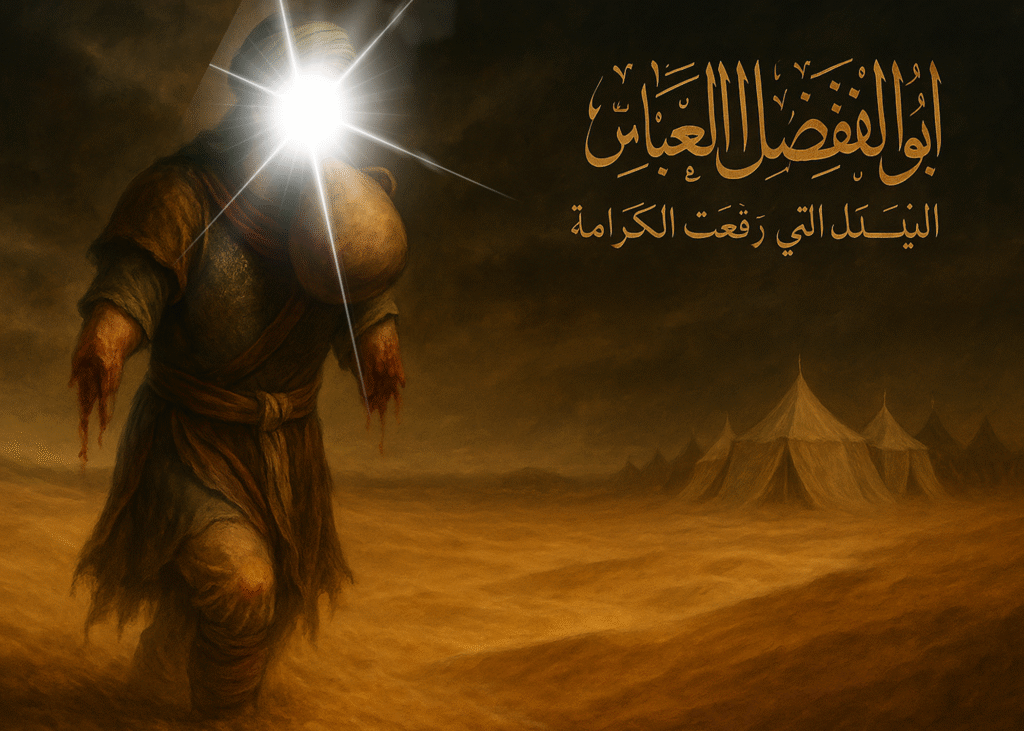Table of Contents
- Introduction
- Who Was Hazrat Abbas (A.S.)?
- The Context of Karbala
- The Mission for Water
- The Moment of Sacrifice: His Hands Severed
- What His Hands Represent
- Symbolism in Shia Culture and Literature
- Ziyarat of Hazrat Abbas (A.S.)
- Duas Inspired by His Sacrifice
- Abbas (A.S.) in the Eyes of the Imams
- Lessons from Abbas’s Hands for Today
- FAQs
- Conclusion
- References
1. Introduction
In the sands of Karbala, one of the most powerful and heart-wrenching symbols is the severed hands of Hazrat Abbas ibn Ali (A.S.). His arms were not just limbs — they were the standard of loyalty, the shield of Ahlul Bayt (A.S.), and a sign of pure sacrifice.
This article delves deep into the significance of Hazrat Abbas’s hands, how they became immortalized in Islamic history, and what they mean to Shia Muslims across the world.
2. Who Was Hazrat Abbas (A.S.)?
Hazrat Abbas (A.S.) was:
- The son of Imam Ali (A.S.) and Ummul Banin (S.A.)
- Half-brother of Imam Hussain (A.S.)
- Known as Abul Fadl, Bab al-Hawaij, and Qamar Bani Hashim (The Moon of the Hashimites)
- The standard-bearer of Imam Hussain’s army
- Renowned for his loyalty, humility, and valor
He was raised with the mission to support truth and protect the dignity of Ahlul Bayt (A.S.), which he fulfilled even after losing both hands.
3. The Context of Karbala
In 61 AH (680 CE), the plains of Karbala witnessed a battle unlike any other. Imam Hussain (A.S.) stood against the tyrant Yazid to defend Islamic values, justice, and truth.
With no water for three days, the children and women in the camp of Imam Hussain (A.S.), especially Bibi Sakina (S.A.), were suffering from thirst. Hazrat Abbas was entrusted with the sacred mission of bringing back water.
4. The Mission for Water
Hazrat Abbas rode out to fetch water from the Euphrates, carrying:
- A sword in one hand
- The standard (alam) of Imam Hussain in the other
- And a mashk (water bag) to bring back water for the children
He successfully reached the river and filled the mashk, but refused to drink, saying:
“O self! After Hussain, you are worthless. Shall I drink while my master is thirsty?”
5. The Moment of Sacrifice: His Hands Severed
As Hazrat Abbas (A.S.) began returning, the enemy ambushed him from all sides. In a moment of sheer brutality:
- One arm was struck and severed
- He continued fighting, holding the water bag with the other
- His second arm was then severed, yet he still held the mashk in his mouth
Even in that state, his focus was only to deliver water to Sakina (S.A.) and the other children.
Eventually, an arrow pierced the water bag, and Abbas (A.S.) fell, calling:
“Akhā, Adrikni!” — O brother, come to me!
Imam Hussain (A.S.) reached him, held his head in his lap, and wept. Abbas (A.S.) requested:
“Do not take me back to the camp — I am ashamed to face Sakina without water.”
6. What His Hands Represent
The severed hands of Hazrat Abbas (A.S.) are not a symbol of defeat — they are a symbol of unmatched spiritual victory.
They represent:
- Loyalty: He chose to lose his arms rather than let go of the water
- Dignity: He never begged for his life, nor did he drink from the river
- Sacrifice: Even in pain, he prioritized the needs of others over his own
- Guardianship: His arms were shields for Ahlul Bayt, and even after losing them, his will remained unshaken
7. Symbolism in Shia Culture and Literature
Across generations and geographies, the hands of Abbas are deeply respected:
- Alams (standards) carried in processions during Muharram symbolize his bravery
- Poets refer to “dono haath kaat diye magar mashk na chhori” — “Both hands were cut, yet he did not drop the water bag”
- His shrine in Karbala is often visited with special prayers seeking protection and healing
In Marsiyas and Nohas, the mention of his severed hands often moves mourners to tears.
8. Ziyarat of Hazrat Abbas (A.S.)
In the Ziyarat of Hazrat Abbas (A.S.), we recite:
“Peace be upon you, O son of the commander of the faithful… the one who gave everything in defense of his brother and never hesitated.”
His Zarih (shrine) is separate from Imam Hussain (A.S.)’s, signifying his unique role and rank in the tragedy.
9. Duas Inspired by His Sacrifice
Many supplications call on Allah by the intercession of Hazrat Abbas:
اللَّهُمَّ بِحَقِّ يَدَيْ أَبِي الْفَضْلِ، ارْزُقْنِي الشِّفَاءَ
Transliteration: Allahumma bi-haqqi yaday Abi al-Fadl, urzuqni ash-shifa’
Translation: O Allah, by the right of the hands of Abu al-Fadl, grant me healing.
Such duas are recited for protection, healing, and courage in times of trial.
10. Abbas (A.S.) in the Eyes of the Imams
Imam Zainul Abideen (A.S.) said:
“My uncle Abbas had insight, faith, and an unshakable stance. He sacrificed his life for his brother, and Allah granted him eyes that see and a heart full of certainty.”
Imam Ja’far as-Sadiq (A.S.) said:
“Abbas has a status on the Day of Judgment that all martyrs will envy.”
11. Lessons from Abbas’s Hands for Today
In today’s world, Hazrat Abbas’s sacrifice teaches us to:
- Defend the weak and protect dignity, no matter the cost
- Stand firm in faith, loyalty, and principle
- Serve the family of the Prophet (PBUH) with absolute sincerity
- Place others before ourselves, especially in moments of hardship
- Be the hands of compassion and service, even when we feel helpless
His story is not a tale of war — it is a guide for moral courage and spiritual integrity.
12. FAQs
Q1: Why are Hazrat Abbas’s hands so significant in Muharram?
They symbolize the ultimate sacrifice for the sake of family, faith, and dignity.
Q2: Is it true Hazrat Abbas never drank water from the river?
Yes. Despite extreme thirst, he refused to drink, out of love for Imam Hussain and the children.
Q3: What is the meaning of “Bab al-Hawaij”?
It means “The Door to Needs” — many believe that prayers through Abbas’s intercession are accepted.
Q4: Where is Hazrat Abbas buried?
In Karbala, Iraq, in a grand shrine next to Imam Hussain (A.S.)
Q5: Why did he not return to the camp after being injured?
He felt ashamed that he couldn’t bring water to Bibi Sakina and asked not to be seen empty-handed.
13. Conclusion
The hands of Hazrat Abbas (A.S.) are not merely a part of his body lost in battle — they are the eternal banner of faith, sacrifice, and honor. In a moment of extreme thirst, pain, and isolation, he chose dignity over comfort, loyalty over life, and faith over fear.
As we remember Karbala, may we carry his message in our own hands — to serve, to protect, and to uphold the values of truth, love, and justice.
14. References
- Maqtal al-Husayn – Abu Mikhnaf
- Bihar al-Anwar – Allama Majlisi
- Al-Islam.org
- Eyewitness accounts of Karbala
- Ziyarat texts of Imam Hussain and Hazrat Abbas (A.S.)

